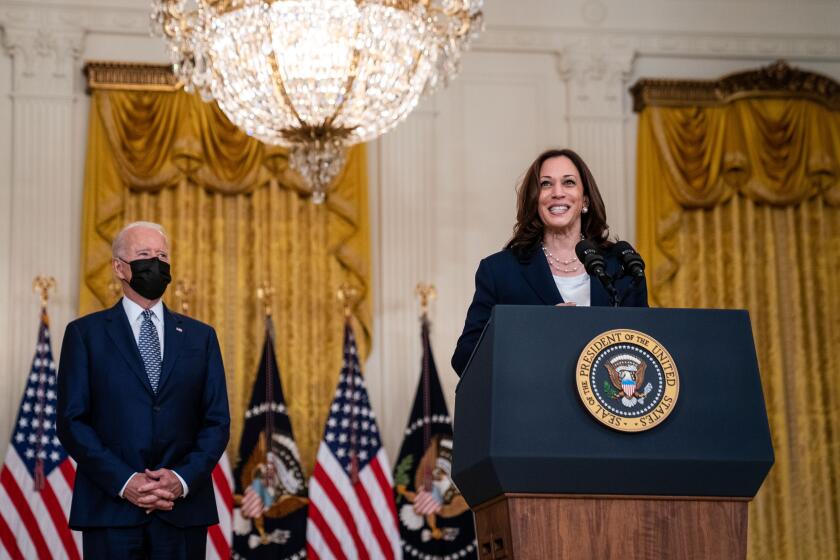Big Insurers Accused of Trying to Suppress Discounting : Insurance: Prop. 103 freed brokers to rebate commissions, but few are doing so.
Nearly four years after Proposition 103 made it legal for insurance agents to rebate part of their sales commissions to customers, such discounting is still all but unknown in California.
“It’s the best-kept secret in the industry,” said Encino broker Kenneth B. Avery, who started rebating a few months ago to boost his recession-whittled sales volume.
Discounters such as Avery and Mark K. White of San Diego say that the efforts of fellow agents and certain big insurance companies to suppress the practice are costing California consumers millions of dollars a year.
A complaint by White prompted the state Department of Insurance to start an investigation of rebating restraint in the industry. If there is sufficient evidence, the state could take administrative action against a company or start court proceedings through the attorney general’s office, said Dennis Ward, chief of enforcement for the Department of Insurance.
“We’re hoping to have something we can talk about very shortly,” he said.
Rebating is the return of a portion of the sales commission to the buyer of an insurance policy. It is commonly used by discounters as an inducement to win customers, particularly wealthy individuals or businesses that purchase large policies.
Because first-year commissions on life insurance policies can run as high as 100%, savings can be impressive. Avery and White both offer minimum rebates of 50% of commission. On a policy with a $25,000 first-year premium and a 50% agent’s commission, for example, the rebate would be $6,250.
Such blue chip insurers as Metropolitan Life Insurance Co., Prudential Insurance Co. of America and Transamerica Occidental Life Insurance Co. try to discourage discounting by refusing to do business with agents who rebate commissions, said White and Avery.
“We have a right to choose who we do business with, and we set certain stipulations that we do not want to deal with people who provide rebates,” a Prudential spokesman said Tuesday, adding: “We don’t think it serves the best interests of the customer in the long run.”
Agents who want to sell Metropolitan policies are required to sign a “Producer Agreement” that says, in part: “No rebating. You or your associates may not rebate or discount premiums to anyone as inducement to buy a Metropolitan or other policy.”
George Thomas, a Transamerica vice president, said his company doesn’t oppose rebating but believes that regulations are needed to guide agents on how to rebate without violating anti-discrimination laws.
“The practice is ungoverned and unregulated,” Thomas said.
Prop. 103 is known as the auto insurance rollback initiative because that was its most publicized feature. However, the measure also contained language making California the only state besides Florida that permits rebating of agents’ commissions. Most states banned the practice in the early 1900s because large agencies tried to use it to drive out competition with predatory pricing.
There is no telling how widespread rebating is in California, but it is confined mainly to life and disability insurance, where commissions are the highest. Ward said that since his investigation began, the department has received two complaints nearly identical to White’s.
White said he has been told that as many as 15% to 20% of California life insurance agents do some rebating, but they keep quiet about it. He believes that his biggest sin in the eyes of the industry has been openly promoting his discounting.
White, whose Direct Insurance Services has been rebating since 1989, said some of the pressure he has felt has been personal.
He recalled a phone call from a top marketing executive for one of the country’s largest life insurers who excoriated him for rebating. In a tirade laced with profanity, the executive said that White was threatening to upset the industry’s entire distribution system and take bread out of the mouths of thousands of agents.
Because White’s agency is affiliated with a discount stock brokerage, incoming calls are tape-recorded. White gave that tape and others to state insurance officials to bolster his complaint that certain insurance giants are illegally trying to restrain him.
The Department of Insurance acknowledges that there is “some ambiguity” in the language of Prop. 103, spokesman Bill Schulz said. He added, however: “Our position is that (rebating) is legal and should be allowed, and certainly prohibitions such as Met Life’s appear to violate the law.”
Metropolitan declined comment on the issue Tuesday.
With 200,000 agents nationwide, “there’s plenty of competition out there, the price is as low as it can realistically be, and also the system is as fair as it can be,” said Gene Grabowski of the American Council of Life Insurance, a trade group. “If you allow rebating to go unchecked, the fairness just goes out the window and everything is tilted in favor of the big guy.”
Similar arguments were made against discount stock brokerages when they appeared, Avery said. While it is true that the biggest customers get the biggest discounts, he said, there are real savings for smaller customers too.
Some $6 billion in life insurance premiums is written yearly in California, Avery said. If commissions averaged 20% of premiums and agents rebated half, consumers would reap $600 million a year, he said.
REBATE DEBATE
Agents who want to sell Metropolitan Life Insurance Co. policies are required to sign a “Producer Agreement” containing this anti-rebating language, which some discounters think violates California’s Proposition 103.
No Rebating. You or your associates may not rebate or discount premiums to anyone as inducement to buy a Metropolitan or other policy.
More to Read
Inside the business of entertainment
The Wide Shot brings you news, analysis and insights on everything from streaming wars to production — and what it all means for the future.
You may occasionally receive promotional content from the Los Angeles Times.






